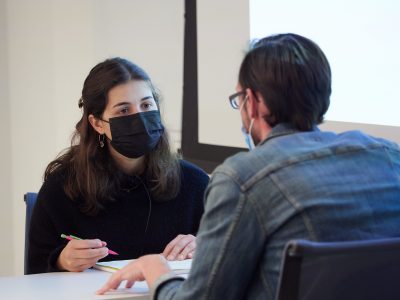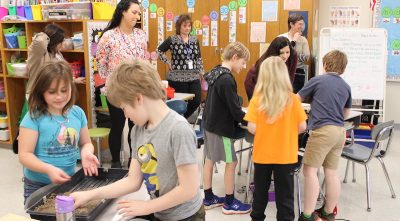Syracuse University School of Education has garnered a worldwide reputation for developing experiential learning methods for educators and other professionals, including clinical simulations, collaborative lesson study, mediated field experiences for student teachers, and tele-counseling training for school counselors.

On March 31, 2022, the school will launch a new center that brings together these initiatives to explore and expand research and practice opportunities and encourage the use of experiential learning across other disciplines. The campus community is invited to the launch of the Center for Experiential Pedagogy and Practice (CEPP) from 4 p.m. to 6 p.m. at the Jacquet Education Commons, Huntington Hall. An RSVP is requested.
Professor Ben Dotger, chair of SOE’s teaching and leadership department, will serve as CEPP director. He has pioneered the use of clinical simulations and other applied teaching and professional development methods over the past 15 years.
“CEPP will engage research and design initiatives across Syracuse University and beyond to advance experiential teaching and professional development,” says Dotger. “The Center’s foundational principle is that immersive experiences advance learners’ preparation for complex professions. As we engage with other professions, we learn that our experiential pedagogies are adaptable, scalable, and—most importantly—highly effective.”
“Our faculty have contributed to a deep body of evidence demonstrating the value of immersive experiences in educative professions,” says Kelly Chandler-Olcott, interim dean of the School of Education. She and Dotger have co-edited a new book, Clinical Simulations as Signature Pedagogy: Educator Preparation Across the Disciplines. The book features chapters by current and former Syracuse University faculty on the use of clinical simulations in mathematics and science education, physical education, educational leadership, counseling and inclusive education.
“The Center’s foundational principle is that immersive experiences advance learners’ preparation for complex professions.”
One of CEPP signature projects, clinical simulations are a common teaching and assessment tool in the health professions, where students have the opportunity to practice communication, diagnostic, and decision-making skills with standardized patients—actors trained to approximate various health concerns—prior to encountering real patients in health care settings.

Dotger first applied the clinical simulation model to the teaching profession in 2007. Since then, he has received research and project funding from the Arthur Vining Davis Foundations, Institute for Education Sciences, National Science Foundation, Spencer Foundation and Syracuse University. He also has expanded the use of clinical simulations beyond the teaching profession. Most notably, a collaboration with the Institute for Veterans and Military Families to prepare student veterans to navigate campus life received a 2019 Syracuse University CUSE Grant.
“Clinical simulations are proven to increase skills that educators need in a real-world setting, particularly for challenging situations such as grade disputes or plagiarism, proactive support of students with disabilities, or addressing suicidal ideation or the aftermath of assault,” says Dotger. “In this low-risk setting, trainees have an immersive experience in which interactions can be observed and they can receive coaching and feedback. Our clinical focus is on practice analysis and data-informed decision making.”
Among other CEPP experiential learning initiatives, Lesson Study is an internationally recognized collaborative process for planning, analyzing, and continuously improving school instruction through live teacher observation, evaluation of student learning, and goal setting. Mediated Field Experiences combine student enrichment, immersive teacher education, and professional development. And tele-counseling—part of a collaboration across Syracuse University and SUNY Upstate Medical University—offers enhanced, hands-on training for mental health professionals with the goal of better serving high-need areas.
“What we have learned about the uses and benefits of clinical simulations has informed other applied learning models that also will be housed in CEPP,” says Dean Chandler-Olcott. “We firmly believe that these pedagogies have many potential applications for teaching and learning across Syracuse University. Our new Center will be a university-wide resource that will help apply best practices in applied learning to specific learning situations across the professions.”
